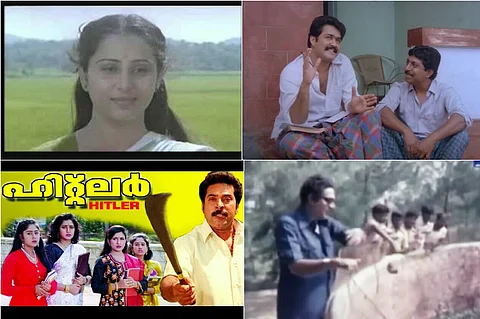

If you grew up in the 80s and 90s watching Malayalam cinema, chances are that you will be familiar with these ubiquitous tropes and stock characters. Malayalam cinema has since evolved a lot with new stars, directors, and technicians changing the game. Here’s a look at the staples of “old gen” films that have more or less disappeared now.
The ‘adichchuthalikkari’ (domestic help) and her son: For the longest time, in Malayalam cinema, every climactic twist worth its salt had a hero whose roots would eventually be linked to the former domestic help of the house (the adichchuthalikkari).
His rich father - deceased/living - would have sired him with her and thus would begin the story of revenge and redemption. He will suddenly resurface as a powerful, prosperous businessman to wreak vengeance, and wooing the beautiful murappennu (the female cousin betrothed to him by tradition) is just one of the many ploys.
The ‘Oppol’ (Elder sister): The calm, virtuous, forever smiling woman who would single-handedly steer the family out of poverty. Soon after, she will be largely ignored when the family sees better days. Or worse (can it ever get better?), she will be seen sobbing her heart out in front of her dead husband’s garlanded photograph.
The chronic bachelor uncle/the vindictive, powerful ‘Ammavan’: The brooding loner who would spring pearls of good advice at the most crucial point of a film. Or, he would be that morose, grumpy elder who has an opinion about everything or stands between the hero and heroine. Or, his sense of vindication will be at its peak when the hero turns wealthy overnight. Or, it is just all three rolled into one.
A billionaire, his bungalow and his only son: That ugly palatial bungalow, with a swimming pool and garden and bored attendants. The suited and booted stern billionaire who is too involved in business to take stock of family and his spoilt son. Sometimes he’d be a widower, looking for a suitable girl to mother his children. The sheer breadth of exhausting possibilities (read: stereotypes) is amazing.
Ragging: If college life has even a fleeting mention in the script, rest assured that there’d be elaborate scenes of ragging. It could be funny, cruel or gut wrenching, but with a mandatory scene of seniors stripping juniors and making a song and dance out of it. Rarely - very rarely – did we get to see the story astutely linked to the ill effects of ragging.
Unemployed youth: Ah! The favourite trope of every old-school filmmaker. Never mind the genre, between 80s and late 90s, every family boasted of a jobless young man. It could be the hero, his brother, his cousin or even the husband. He’d in turn be mocked, sympathised with, laughed at, or allowed to lecture about the issue. Sometimes, he’d even turn to the underworld for inspiration or eventually turn into a hero. It’s a given that his girlfriend would ditch him. The family support really depended on the mood of the director.
The Murappennu (the female cousin a man is betrothed to by tradition): The one who never gets tired of drawing circles on the floor with her toe. The shy young thing whose only purpose in life is to marry her muracherukkan/hero. Every day starts with a “pushpanjali” in his name at the local temple and the rest of the time is spent in writing letters, daydreaming or just staring out the window, awaiting his return. Did we mention that she seldom gets out of her pavada/davani?
The animal loving villain: The sly, pipe smoking, wretched villain who loves his dogs and horses (of thoroughly unimaginative names)—Lucy, Dolly, Roger and the others. But nothing really beats this iconic scene where Jose Prakash (our man with the blinding glares, pipe and smirk) throws food at his pet crocodiles and calls out to one of them— “My dear Johnny, see what I have for you today.” When the crocodiles slither toward him for their share, he says affectionately, “What my children, please share the food.”
‘Puraniranjunikkan vendi mathram nikkunna’ sisters of the hero (Sisters of the hero who're waiting around forever to be married): For some inexplicable reason, the sister/s of the hero are either unmarried, underfed or are married and sitting at home for dowry issues. Sometimes they are widowed or have been deserted. Sometimes they have dramatic backstories that add nothing to the narrative. They are neither ambitious, independent nor do they have a mind of their own. Their lives are totally dependent on their brother’s magnanimity and everything is lost without him or his attempts to get them married.
This article was first published on Fullpicture.in. The News Minute has syndicated the content. You can read the original article here.